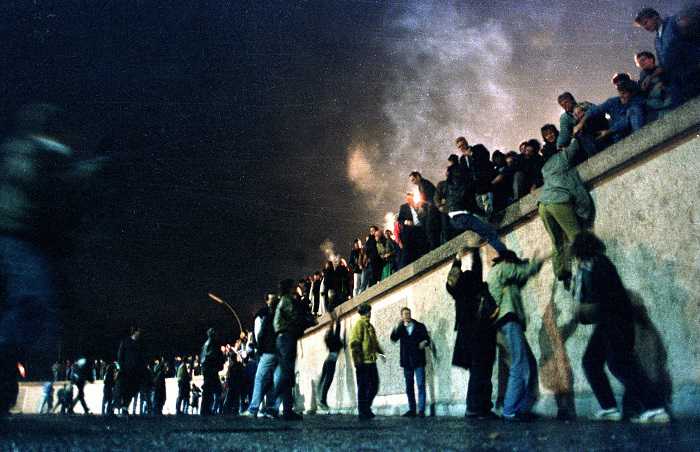Germany celebrates 25th anniversary of fall of Berlin Wall

– World news selected by Gazette editors for Phuket’s international community
PHUKET: More than a million Germans and people from around the world on Sunday celebrated the 25th anniversary of the fall of the Berlin Wall, the event that more than any other marked the end of the Cold War.
A spectacular 15 kilometre-long string of 7,000 illuminated helium balloons traced the course of the barrier that once snaked through the city, slicing across streets, between families and even through graveyards.
They were set free one after another into the night sky, symbolising the breaching of the Wall by crowds of protesters in 1989. The Berlin Staatskapelle orchestra played Beethoven’s 9th Symphony “Ode to Joy” in front of the Brandenburg Gate.
“We’re the happiest people in the world and we’re thrilled that you brought the Berlin Wall down 25 years ago,” Berlin’s Mayor Klaus Wowereit said as the first balloons were sent aloft. “Nothing and no one can stand in the way of freedom.”
Germans, whose national pride was shattered by Nazism, the Second World War and the Holocaust, have proudly focused on the peaceful East German revolution that felled the Wall as a rare and bright shining moment in their modern history.
Festivities to mark the anniversary drew more than one million Berliners and tourists to the heart of the once-divided city. Earlier, Peter Gabriel played a powerful rendition of “Heroes” and several German artists performed on stage as well.
Despite the fog and cold, many wandered along the former “death strip” where the Wall stood and where the illuminated helium balloons forming the “Lichtgrenze”, or Border of Light, were perched 3.6 metres (11.8 feet) high on poles matching the height of the barrier built in 1961 by Communist East Germany.
The crowd also cheered when former Soviet leader Mikhail Gorbachev, widely admired in Germany for his role in paving the way for the Wall’s collapse, stood and waved. He ominously warned in a speech in Berlin on Saturday that a new Cold War was looming over the Ukraine crisis.
WORLD LOOKS TO BERLIN
The anniversary of the Wall’s fall was marked around the world. Pope Francis told tens of thousands of people in St. Peter’s Square that it should spur people to try to topple other walls. “Where there is a wall, there is a closing of hearts. We need bridges, not walls,” he said.
Earlier on Sunday, Chancellor Angela Merkel said the fall of the Wall showed the world that “dreams can come true” and should inspire people trapped in tyranny everywhere.
Merkel, a young physicist in Communist East Berlin when she got her first taste of freedom on Nov. 9, 1989, said in a speech that the Wall’s opening in response to mass popular pressure would be eternally remembered as a triumph of the human spirit.
“The fall of the Berlin Wall showed us that dreams can come true and that nothing has to stay the way it is, no matter how high the hurdles might seem to be,” said Merkel.
“It showed that we have the power to shape our destiny and make things better,” she said, noting that people in Ukraine, Syria, Iraq and elsewhere around the world should feel heartened by the example of the Wall’s sudden demise.
“It was a victory of freedom over bondage.”
But she added the date Nov. 9 bears historical burdens. It was also the day in 1938 of the anti-Jewish pogrom “Kristallnacht”, or “Night of Broken Glass”, when Nazis carried out attacks on synagogues and Jewish shops across Germany.
The Berlin Wall was built in 1961 to stop East Germans fleeing to the West. It began as a barbed wire and cinder block wall and was then fortified as a heavily guarded 160 km (100-mile) white concrete barrier that encircled West Berlin.
DIVISIONS REMAIN
At least 138 people were killed trying to escape to West Berlin and many who were captured ended up in jail.
Communist regimes collapsed in the face of popular uprisings across Eastern Europe in 1989, signalling the end of the Cold War, of which the Berlin Wall had become the starkest symbol.
But despite the Wall’s fall, German unity a year later and 2 trillion euros pumped into the formerly communist east of the country, there are still lingering east-west political, economic and social divisions in the city and country.
Voting patterns in east Berlin and eastern Germany are different, there is still an east-west income and wealth gap, and unemployment is nearly twice as high in the east.
“Forty years of division left their mark on many,” said Kai Arzheimer, political scientist at the University of Mannheim. “The differences might be diminishing as years pass but only a lot slower than anyone would have dreamt 25 years ago.”
— Phuket Gazette Editors
Latest Thailand News
Follow The Thaiger on Google News:


























